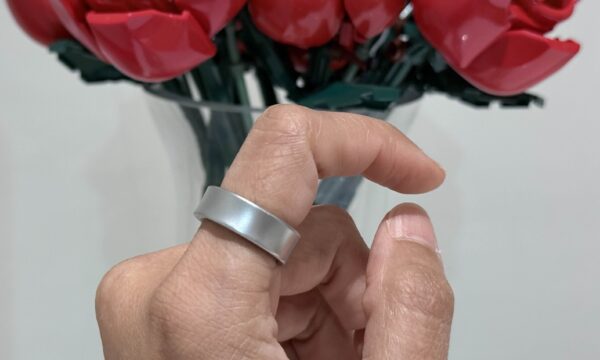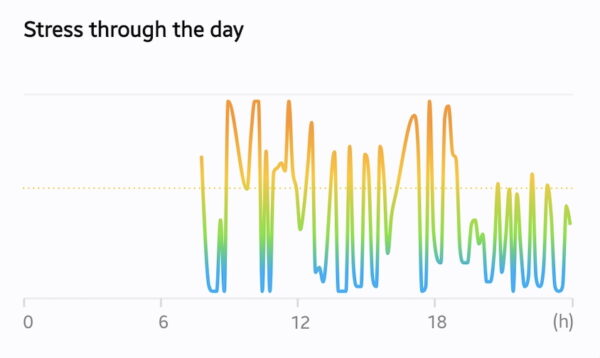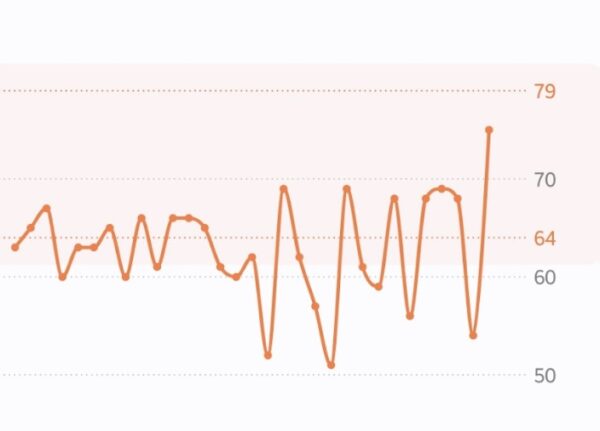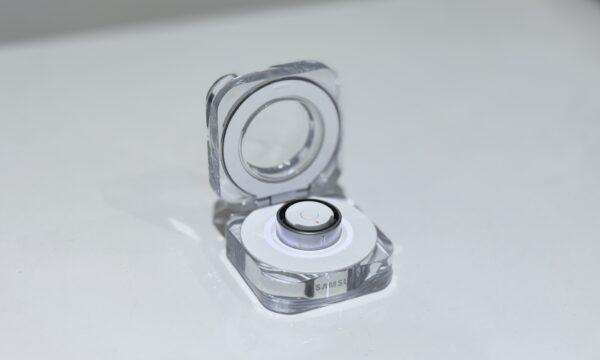The global wearable device market is made up of smartwatches, fitness trackers, hearables, and most recently, smart rings.

South Africans could purchase third-party smart rings, like the NexRing, which we’ve reviewed on Recharged, until the Galaxy Ring arrived in April 2024.
We’ve been testing the Galaxy Ring for over a month now. Samsung provided a review unit, which is made from titanium. It comes in black, gold, or the matte silver shade that we opted for, in a size 7.
Samsung has made ring sizing kits available via its website.
The ring pairs with Android 11 and upwards on Samsung devices but not with other Androids or iOS. I linked it to a Galaxy device using the Samsung Wearable app. It includes a transparent charging case and cable.

The charging case has light indicator to show battery levels once the ring is placed onto it, and Samsung claims it can recharge 1.6 times, which is not even twice. I use it as a charger connected permanently to a cable, and not on its own.
My ring was comfortable given its 2.4g weight, which has a 17mAh battery, smaller than the largest size’s 22.55mAh. I did not get the promised seven-day battery, but rather five days due to the size of the battery, which I soon realised.
The Galaxy Ring integrates with the Samsung Health app, which requires a registered account to add basic information like gender, height, weight, etc.
If you already own a Samsung smart watch, you may have this information filled out on your profile.
Once you’re set up, you can open the Wearable app to keep track of your data. It displays four main categories of data: energy score, sleep, heart rate, and stress levels.

I paired it to a smartphone in the beginning and felt like the lights on the sensors were permanently on, the red and green; no matter what I did. It was very distracting, especially at night. After reading up on a few forums, I decided to back up my data and set it up again, but I used a different Samsung handset, and the issue was fixed.
Stress and sleep data
I could see fluctuating accurate data for my stress levels. For example, a road trip day with an EV showed a ‘moderate stressful’ reading, while a public holiday day resting indoors showed a ‘relaxed’ reading.

Under the stress tab you can see your levels throughout the day and a breakdown by categories.
You also get prompted to practice mindfulness habits to reduce stress and can take measurements on demand.
I received a mostly good rating for sleep data. However, my sleep stages differed from my Apple Watch.
For instance, my Apple Watch recorded 34 minutes of Deep Sleep, while my ring picked up an hour and 6 minutes for that window.

My sleep scores have been mostly good, regardless of duration, which makes me wonder how accurate it is. I’ve been under the impression that less sleeps means poor quality sleep.
I must be honest; I don’t really know what to do with data like the energy score. It based on sleep data. If I get 6 hours of sleep, the rating shows in red, which is not good, yet still get a high sleep score.
Don’t get me wrong, there’s a whole section explaining how the data is calculated but I’m sceptical because I know I didn’t get enough sleep, regardless of the tracker.
Tracking movement
I also noticed discrepancies in calorie counts for days on the treadmill, example, 300 less on the ring than my Apple Watch, and for mall walks. An example, the ring showed 9.37km while my watch read 5.72km; I did not walk over 9kms on the day referenced.

I’ve found that the ring isn’t suitable for fitness tracking as you cannot start or choose workouts. This can be done if you own a smart watch with more granular controls and data.
While it automatically pick up a walk on the treadmill, it cannot distinguish a hike. If you’re into gym, rather get a smart or fitness watch for tracking.
Checking vitals
Where the Galaxy Ring shines is tracking vitals like heart rate as you can create alerts for high or low levels; and measure or track blood oxygen and snore detection.
Under heart rate, you can see your range for the day, minimum or maximum rate per hour, various readings throughout the day, and your resting heart trends, which can be viewed by the week, month or year. It does not give you a hear rate variability.

It also tracks skin temperature or cycle tracking like period prediction, ovulation and fertile windows; however, I was not comfortable sharing such personal information with a tech company.
Samsung Galaxy Ring final thoughts
The Galaxy Ring is more suited for a health and wellness check rather than fitness and may appeal to the elderly or anyone monitoring vitals.

If you’re training or doing intense workouts, swimming or cycling, you are better off using a specialised smartwatch to track that data. But if you want sleep data without wearing a watch, then perhaps the ring would make sense.
While there is no monthly fee to access your data like the Oura ring, at R8 000, you’re paying for being an early adopter.
6.8 Score
Pros
- Great for checking vitals
- Lightweight, unobtrusive
- No monthly subscription
- Comfortable to wear daily
Cons
- Limited to Samsung users
- Data accuracy questionable
- Pricey
Final Verdict
The Galaxy Ring is lightweight and better suited to monitoring vitals but not for tracking workouts. If you're into fitness, a smartwatch is better. At R8 000, you’re paying for being an early adopter.
Nafisa Akabor
Related posts
ABOUT

Recharged is an independent site that focuses on technology, electric vehicles, and the digital life by Nafisa Akabor. Drawing from her 18-year tech journalism career, expect news, reviews, how-tos, comparisons, and practical uses of tech that are easy to digest. info@recharged.co.za





